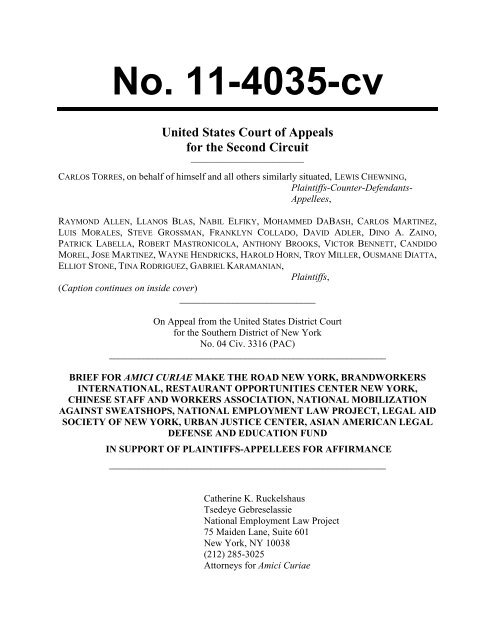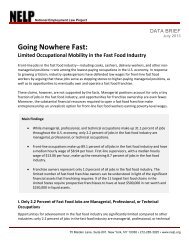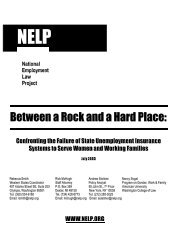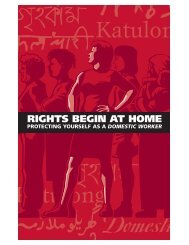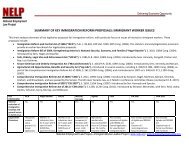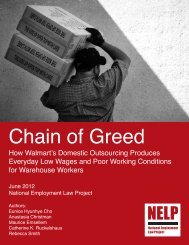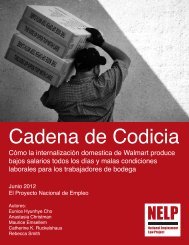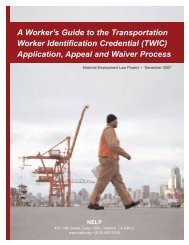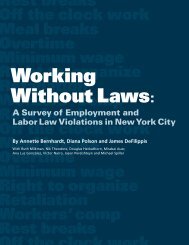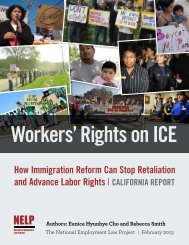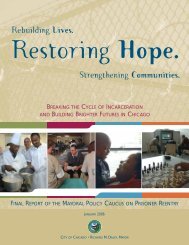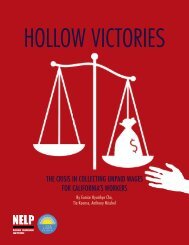Torres v. Gristede's Operating Corp.
Torres v. Gristede's Operating Corp.
Torres v. Gristede's Operating Corp.
You also want an ePaper? Increase the reach of your titles
YUMPU automatically turns print PDFs into web optimized ePapers that Google loves.
No. 11-4035-cv<br />
United States Court of Appeals<br />
for the Second Circuit<br />
____________________________<br />
CARLOS TORRES, on behalf of himself and all others similarly situated, LEWIS CHEWNING,<br />
Plaintiffs-Counter-Defendants-<br />
Appellees,<br />
RAYMOND ALLEN, LLANOS BLAS, NABIL ELFIKY, MOHAMMED DABASH, CARLOS MARTINEZ,<br />
LUIS MORALES, STEVE GROSSMAN, FRANKLYN COLLADO, DAVID ADLER, DINO A. ZAINO,<br />
PATRICK LABELLA, ROBERT MASTRONICOLA, ANTHONY BROOKS, VICTOR BENNETT, CANDIDO<br />
MOREL, JOSE MARTINEZ, WAYNE HENDRICKS, HAROLD HORN, TROY MILLER, OUSMANE DIATTA,<br />
ELLIOT STONE, TINA RODRIGUEZ, GABRIEL KARAMANIAN,<br />
Plaintiffs,<br />
(Caption continues on inside cover)<br />
____________________________<br />
On Appeal from the United States District Court<br />
for the Southern District of New York<br />
No. 04 Civ. 3316 (PAC)<br />
_________________________________________________________<br />
BRIEF FOR AMICI CURIAE MAKE THE ROAD NEW YORK, BRANDWORKERS<br />
INTERNATIONAL, RESTAURANT OPPORTUNITIES CENTER NEW YORK,<br />
CHINESE STAFF AND WORKERS ASSOCIATION, NATIONAL MOBILIZATION<br />
AGAINST SWEATSHOPS, NATIONAL EMPLOYMENT LAW PROJECT, LEGAL AID<br />
SOCIETY OF NEW YORK, URBAN JUSTICE CENTER, ASIAN AMERICAN LEGAL<br />
DEFENSE AND EDUCATION FUND<br />
IN SUPPORT OF PLAINTIFFS-APPELLEES FOR AFFIRMANCE<br />
_________________________________________________________<br />
Catherine K. Ruckelshaus<br />
Tsedeye Gebreselassie<br />
National Employment Law Project<br />
75 Maiden Lane, Suite 601<br />
New York, NY 10038<br />
(212) 285-3025<br />
Attorneys for Amici Curiae
BRIAN HOMOLA, ANNA GARRETT, NELSON BETANCOURT, JOSE DELACRUZ, YURI LAMARCHE,<br />
MICHAEL GROSECLOSE, RODOLFO DELEMOS, PIO MOREL, ABIGAIL CLAUDIO, MALICK DIOUF,<br />
DAVID OTTO, ALEJANDRO MORALES, VICTOR DIAZ, PAUL PETROSINO, EDUARDO GONZALEZ, JR.,<br />
JOSE BONILLA-REYES, VINCENT PEREZ, MARTIN GONZALEZ, CALVIN ADAMS, WILLIAM FRITZ,<br />
KATHERINE HALPERN, CHRISTIAN TEJADA, EDWARD STOKES, PLINIO MEDINA, TOWANA STARKS,<br />
LAWSON HOPKINS, RUBEN M. ALEMAN, EUGENE RYBACKI, EARL CROSS, MANOLO HIRALDO,<br />
ROBERT HAIRSTON,<br />
and<br />
BOBBY IRIZARRY, RUBEN MORA, JOSELITO AROCHO, JOSEPH CREMA, ALFRED CROKER, FRANK<br />
DELEON, MARIO DIPRETA, WILLIAM HELWIG, ROBERT MISURACA, ROBERT PASTORINO, VICTOR<br />
PHELPS, DANIEL SALEGNA, GILBERTO SANTIAGO,<br />
Plaintiffs-Appellees,<br />
v.<br />
GRISTEDE’S OPERATING CORP., GRISTEDE’S FOODS NY, INC., NAMDOR, INC., GRISTEDE’S FOODS,<br />
INC., CITY PRODUCE OPERATING CORP.,<br />
Defendants-Counter-Claimants,<br />
GALLO BALSECA, JAMES MONOS,<br />
Defendants,<br />
JOHN CATSIMATIDIS,<br />
Defendant-Appellant.
RULE 26.1 CORPORATE DISCLOSURE STATEMENT<br />
Pursuant to Federal Rule of Appellate Procedure 29(c), Amici Curiae hereby<br />
provide the following disclosure statements:<br />
Make the Road New York is a non-profit corporation that offers no stock;<br />
there is no parent corporation or publicly owned corporation that owns 10% or<br />
more of this entity’s stock.<br />
Brandworkers International is a non-profit corporation that offers no<br />
stock; there is no parent corporation or publicly owned corporation that owns 10%<br />
or more of this entity’s stock.<br />
Restaurant Opportunities Center New York is a non-profit corporation<br />
that offers no stock; there is no parent corporation or publicly owned corporation<br />
that owns 10% or more of this entity’s stock.<br />
Chinese Staff and Workers Association is a non-profit corporation that<br />
offers no stock; there is no parent corporation or publicly owned corporation that<br />
owns 10% or more of this entity’s stock.<br />
National Mobilization Against Sweatshops is a non-profit corporation that<br />
offers no stock; there is no parent corporation or publicly owned corporation that<br />
owns 10% or more of this entity’s stock.
National Employment Law Project is a non-profit corporation that offers<br />
no stock; there is no parent corporation or publicly owned corporation that owns<br />
10% or more of this entity’s stock.<br />
Legal Aid Society of New York is a non-profit corporation that offers no<br />
stock; there is no parent corporation or publicly owned corporation that owns 10%<br />
or more of this entity’s stock.<br />
Urban Justice Center is a non-profit corporation that offers no stock; there<br />
is no parent corporation or publicly owned corporation that owns 10% or more of<br />
this entity’s stock.<br />
Asian American Legal Defense and Education Fund is a non-profit<br />
corporation that offers no stock; there is no parent corporation or publicly owned<br />
corporation that owns 10% or more of this entity’s stock.
TABLE OF CONTENTS<br />
TABLE OF AUTHORITIES ................................................................................... iii<br />
STATEMENT OF INTEREST OF AMICI CURIAE ................................................ 1<br />
SUMMARY OF ARGUMENT ................................................................................. 6<br />
ARGUMENT ...........................................................................................................10<br />
I. IT IS FAIR AND NECESSARY TO HOLD INDIVIDUALS LIKE<br />
CATSIMATIDIS JOINTLY AND SEVERALLY LIABLE UNDER SECTION<br />
203(d) BECAUSE OF PERSISTENT BARRIERS TO RECOVERY OF<br />
UNPAID WAGES EVEN AFTER A LIABILITY FINDING, AND<br />
CONTINUING HIGH RATES OF VIOLATIONS, ESPECIALLY IN LOW-<br />
WAGE INDUSTRIES LIKE RETAIL. ................................................................10<br />
A. Individual Liability Deters Violations and is a Crucial Alternative Through<br />
Which Workers Can Recover Their Illegally Withheld Wages, Especially in<br />
Cases Where Workers are Unable to Recover From the <strong>Corp</strong>orate<br />
Defendant(s).......................................................................................................10<br />
B. A Reversal Would Undermine the Act By Rewarding Catsimatidis’<br />
Behavior to Avoid Compliance with the Act. ...................................................12<br />
C. The FLSA Must Be Interpreted Consistent With Its Broad Remedial<br />
Purpose to Hold Individuals Like Catsimatidis Liable Because Rampant<br />
Violations of Wage and Hour Rights Persist, Particularly in Low-Wage<br />
Industries Like Retail. ........................................................................................15<br />
II. INDIVIDUAL LIABILITY UNDER 29 U.S.C. § 203(d) IS EXPANSIVE,<br />
CONSISTENT WITH THE REMEDIAL PURPOSE OF THE FLSA. ..............19<br />
III. DETERMINING WHETHER AN INDIVIDUAL ACTED “DIRECTLY<br />
OR INDIRECTLY IN THE INTEREST OF” THE CORPORATE EMPLOYER<br />
IS A BROAD INQUIRY, FOCUSING ON THE RELATIONSHIP BETWEEN<br />
THAT INDIVIDUAL AND THE CORPORATE ENTITY AND EXAMINING<br />
THE EXTENT TO WHICH THE INDIVIDUAL HAD CONTROL OVER THE<br />
i
CORPORATION SUCH THAT HIS DECISIONS AND ACTIONS ON<br />
BEHALF OF THE CORPORATION CAN IMPACT COMPLIANCE WITH<br />
THE FLSA. ...........................................................................................................22<br />
A. The Test for Determining Individual Liability in the Instant Case is<br />
Whether Catsimatidis, as a Result of His Relationship With the <strong>Corp</strong>orate -<br />
Employer, Is Acting in the Interest of That Employer as it Relates to the<br />
Employee(s). ......................................................................................................23<br />
B. The Expansive Definition of “Employer” Under Section 203(d) to Include<br />
Individuals With Operational Control of the <strong>Corp</strong>oration is Consistent With<br />
FLSA’s Goal of Eliminating Substandard Wages and Working Conditions By<br />
Broadly Defining Employer Accountability to Reach All Those in a Position to<br />
Prevent Violations of the Act. ...........................................................................25<br />
C. Courts Routinely Hold Liable as Employers Individuals With Far Less<br />
Operational Control Over the <strong>Corp</strong>orate Entity Than Catsimatidis. .................29<br />
CONCLUSION ........................................................................................................31<br />
ii
TABLE OF AUTHORITIES<br />
Cases<br />
A.H. Phillips v. Walling, 324 U.S. 490 (1945) ........................................................19<br />
Ansoumana v. Gristede’s <strong>Operating</strong> <strong>Corp</strong>., 255 F. Supp. 2d 184 (S.D.N.Y. 2003)<br />
....................................................................................................................... 27, 28<br />
Barrentine v. Arkansas Best Freight System, Inc., 450 U.S. 728 (1981) ................19<br />
Baystate Alternative Staffing v. Herman, 163 F.3d 668 (1st Cir. 1998) ..............9, 22<br />
Boucher v. Shaw, 572 F.3d 1087 (9th Cir. 2009) ....................................................12<br />
Chan v. Sung Yue Tung <strong>Corp</strong>., d/b/a/ 88 Palace, No. 03 Civ. 6048 (GEL), 2007<br />
WL 313483 (S.D.N.Y. Feb. 1, 2007) ............................................................ 30, 31<br />
Dole v. Elliot Travel & Tours, Inc., 942 F.2d 962 (6th Cir. 1991) .................. passim<br />
Dole v. Simpson, 784 F. Supp. 538 (S.D. Ind. 1991) ...............................................25<br />
Donavan v. Agnew, 712 F.2d 1509 (1st Cir. 1983) .......................................... 24, 28<br />
Donavan v. Grim Hotel, 747 F.2d 966 (5th Cir. 1984) .......................................7, 26<br />
Donavan v. Maxim Industries, 552 F.Supp. 1024 (D. Mass 1982) .........................25<br />
Donavan v. Sovereign Sec. Ltd., 726 F.2d 55 (2d Cir. 1984) ........................... 13, 14<br />
Herman v. RSR Security Servs., 172 F.3d 132 (2d Cir. 1999) .................... 22, 26, 29<br />
Lopez v. Silverman, 14 F. Supp.2d 405 (S.D.N.Y. 1998) ................................. 12, 22<br />
Rutherford Food <strong>Corp</strong>. v. McComb, 331 U.S. 722 (1947) ......................................20<br />
Schultz v. Chalk-Fitzgerald Const. Co., 300 F.Supp. 1255 (D. Mass 1970) ...........24<br />
iii
Sec’y of Labor, U.S. Dep’t of Labor v. Lauritzen, 835 F.2d 1529 (7th Cir. 1987) .23<br />
Tennessee Coal, Iron & R. Co. v. Muscoda Local No. 123, 321 U.S. 590 (1944) ..10<br />
<strong>Torres</strong> v. Gristede’s <strong>Operating</strong> <strong>Corp</strong>. (<strong>Torres</strong> II), 628 F. Supp. 2d 447 (S.D.N.Y.<br />
2008) ....................................................................................................................... 6<br />
<strong>Torres</strong> v. Gristede’s <strong>Operating</strong> <strong>Corp</strong>., No. 04 Civ. 3316, 2011 WL 4571792<br />
(S.D.N.Y. Sept. 23, 2011) ................................................................... 7, 13, 28, 29<br />
United States v. Rosenwasser, 323 U.S. 360 (1945) ...........................................9, 21<br />
Walling v. Portland Terminal Co., 330 U.S. 148 (1947).........................................21<br />
Yu G. Ke v. Saigon Grill, Inc., 595 F. Supp. 2d 240 (S.D.N.Y. 2008) ............. 29, 30<br />
Statutes<br />
29 U.S.C. § 202(a) ...............................................................................................7, 19<br />
29 U.S.C. § 202(b) ...................................................................................................15<br />
29 U.S.C. § 203(d) ........................................................................................... passim<br />
29 U.S.C. § 203(m) ..................................................................................................11<br />
Other Authorities<br />
Annette Bernhardt et. al., Broken Laws, Unprotected Workers: Violations of<br />
Employment and Labor Laws in America’s Cities, Center for Urban Economic<br />
Development at the University of Illinois-Chicago, Nat’l Employment Law<br />
Project & UCLA Institute for Research on Labor and Employment (September<br />
2009) .............................................................................................................. 16, 18<br />
Annette Bernhardt, Diana Polson and James DeFilippis, Working Without Laws: A<br />
Survey of Employment and Labor Law Violations in New York City, National<br />
Employment Law Project (2010) .........................................................................17<br />
iv
Annette Bernhardt, Siobhan McGrath and James DeFilippis, Unregulated Work in<br />
the Global City: Employment and Labor Law Violations in New York City,<br />
Brennan Center for Justice at New York University School of Law (2007) .......17<br />
Bruce Goldstein, Marc Linder, Laurence E. Norton II & Catherine Ruckelshaus,<br />
Enforcing Fair Labor Standards in the Modern American Sweatshop:<br />
Rediscovering the Statutory Definition of Employment, 46 UCLA L. Rev. 983<br />
(April 1999) ................................................................................................... 14, 20<br />
David Weil & Amanda Pyles, Why Complain Complaints, Compliance, and the<br />
Problem of Enforcement in the U.S. Workplace, 27 COMP. LAB. L. & POL’Y<br />
J. 59, 83 (2005) .............................................................................................. 18, 19<br />
Noah Zatz, “Working Beyond the Reach or Grasp of Employment Law,” The<br />
Gloves-Off Economy: Workplace Standards at the Bottom of America’s Labor<br />
Market, Annette Bernhardt, Heather Boushey, Laura Dresser and Chris Tilly<br />
(eds.) (Ithaca: Cornell University Press, 2009) ....................................................15<br />
Stephanie Luce & Naoki Fujita, Discounted Jobs: How Retailers Sell Workers<br />
Short, City University of New York and the Retail Action Project (January 2012)<br />
..............................................................................................................................17<br />
Testimony, Nancy J. Leppink, Deputy Wage and Hour Administrator, U.S. Dep’t<br />
of Labor Before the U.S. House of Representatives (November 3, 2011) ...........18<br />
U.S. Gov’t. Accountability Office, GAO-09-458T, Wage and Hour Division’s<br />
Complaint Intake and Investigative Processes Leave Low Wage Workers<br />
Vulnerable to Wage Theft 18 (March 25, 2009) ...................................................19<br />
Winning Wage Justice: A Summary of Research on Wage and Hour Violations in<br />
the United States, National Employment Law Project (January 2012) ...............15<br />
v
STATEMENT OF INTEREST OF AMICI CURIAE 1<br />
Amici are organizations dedicated to ensuring that the Fair Labor Standards<br />
Act (“FLSA”) is interpreted and enforced consistent with its broad remedial nature<br />
so that workers are paid fairly and fully for all work performed. Amici Make the<br />
Road New York, Brandworkers International, Restaurant Opportunities Center<br />
New York, Chinese Staff and Workers Association and National Mobilization<br />
Against Sweatshops have members residing in Second Circuit states who would be<br />
adversely impacted by a ruling against the Plaintiffs-Appellees. Amici submit this<br />
brief not to repeat the arguments made by the parties, but to shed light on the<br />
historical and statutory underpinnings of the Fair Labor Standards Act, including<br />
the definition of “employer” under Section 203(d) and the public policies<br />
embodied in the Act, and to bring to the Court’s attention our unique perspectives<br />
of low-wage workers’ experiences in enforcing their wage and hour rights. We<br />
urge the Court to consider the large numbers of workers whose right to recover<br />
their unlawfully withheld wages would be undermined under the Appellant’s<br />
misrepresentation of the FLSA.<br />
1 Party’s counsel did not author this brief, nor did the party or the party’s counsel<br />
contribute money intended to fund the preparation or submission of the brief. No<br />
person other than the Amici curiae, their members, or their counsel contributed<br />
money that was intended to fund the preparation or submission of the brief.<br />
1
Amici respectfully submit this brief pursuant to Federal Rules of Appellate<br />
Procedure 27 and 29 and Second Circuit Local Rule 29-1. The brief should be<br />
permitted without leave of court because all parties have consented to its filing.<br />
Fed. R. App. P. 29(a).<br />
Make the Road New York (MRNY) is a membership based non-profit<br />
organization with more than 11,000 members and offices in Brooklyn, Queens,<br />
Staten Island and Long Island. For the last fifteen years MRNY has been fighting<br />
for the rights of low-wage workers who have experienced the most severe forms of<br />
wage theft. MRNY has litigated and recovered hundreds of thousands of dollars in<br />
unpaid wages and has successfully pursued legislation such as the Wage Theft<br />
Prevention Act, strengthening labor law protections in New York State.<br />
Narrowing the definition of employer under 203(d) would severely undercut these<br />
basic protections for workers, allowing individual employers to manipulate the<br />
corporate entity and escape liability.<br />
Brandworkers International is a non-profit organization protecting and<br />
advancing the rights of retail and food employees. Brandworkers' members<br />
frequently seek to hold individual employers liable for minimum wage and<br />
overtime violations to help ensure judgments are honored. Narrowing the<br />
employer definition under the FLSA would increase the likelihood that<br />
2
Brandworkers members would suffer illegal underpayment of wages with no<br />
monetary recovery even after a finding of liability.<br />
Restaurant Opportunities Center New York (ROC-NY) is a membership<br />
organization of restaurant workers that seeks to improve working conditions<br />
through research and policy work and providing organizing support to workers.<br />
Because restaurant workers suffer high rates of wage and hour violations, the<br />
FLSA’s expansive definition of “employer” under 203(d) is crucial for ROC-NY<br />
members, who oftentimes need to hold individuals liable for minimum wage and<br />
overtime violations to ensure they can collect their unpaid wages.<br />
Founded in 1979, Chinese Staff and Workers Association (CSWA) has more<br />
than 1,300 members, many of whom work in restaurants in New York City and on<br />
Long Island. CSWA assists its members in combating illegal and exploitative<br />
conditions in these restaurants, including violations of the FLSA and NYLL, and<br />
the expansive definition of “employer” under 203(d) is vital in ensuring that<br />
CSWA members can recover their unpaid wages.<br />
National Mobilization Against Sweatshops is a non-profit workers center<br />
whose members include workers employed in the service, retail, garment,<br />
construction and white-collar industries. Many of NMASS’ members’ efforts to<br />
recover owed minimum wage and overtime pay and improve working conditions<br />
are thwarted by companies’ tactics to avoid responsibility by closing down and<br />
3
changing names or declaring bankruptcy. The ability to hold individual employers<br />
liable for owed wages is vital for these workers’ efforts to enforce their rights<br />
under the FLSA.<br />
The National Employment Law Project (NELP) is a non-profit legal<br />
organization with over 40 years of experience advocating for the employment and<br />
labor rights of low-wage and unemployed workers. NELP seeks to ensure that all<br />
employees receive the full protection of labor and employment laws, and that<br />
employers are not rewarded for skirting those basic rights. NELP collaborates<br />
closely with community-based worker centers and has litigated and participated as<br />
amicus in numerous cases addressing employee rights under the FLSA. In<br />
NELP’s experience, an expansive reading of the term “employer” under the FLSA,<br />
consistent with that statute’s remedial purpose, is crucial in ensuring that low-wage<br />
workers in particular can fully recover their unpaid wages.<br />
The Legal Aid Society is the oldest and largest provider of legal assistance<br />
to low-income families and individuals in the United States. The Society’s<br />
Employment Law Unit in New York City represents low-wage workers in<br />
employment-related matters such as claims for unpaid wages. The Unit often<br />
litigates against employers that use corporate forms to try to evade responsibility<br />
under various labor laws or to make collection of judgments difficult. The broad<br />
4
definition of “employer” under the FLSA is critical to the Unit’s ability to enforce<br />
that Act.<br />
Founded in 1984, the Urban Justice Center (UJC) is a New York City-based<br />
nonprofit organization that represents many low-wage employees who have sought<br />
redress in the courts against employers who have violated the FLSA and New York<br />
Labor Law (NYLL). Almost all of the corporations that employ UJC’s clients are<br />
privately owned and represent themselves as having limited assets to satisfy<br />
judgments or settlements. These corporations typically operate small businesses,<br />
such as restaurants, nail salons and convenience stores, and do significant business<br />
off the books, making it hard for employees to trace assets that can satisfy their<br />
claims. In light of these challenges, the ability to hold the principals of these<br />
corporations liable is of critical importance to the ability of UJC’s clients and other<br />
low-wage workers to vindicate their rights under the FLSA and NYLL.<br />
Founded in 1974, the Asian American Legal Defense and Education Fund<br />
(AALDEF) is a national non-profit organization that protects and promotes the<br />
civil rights of Asian-Americans through litigation, advocacy, education, and<br />
organizing. AALDEF represents low-wage workers in actions under the FLSA<br />
and NYLL, and AALDEF’s clients have frequently been unable to collect against<br />
corporate defendants, even after a finding of liability, making it critical that these<br />
workers are able to recover their unpaid wages from individual employers.<br />
5
SUMMARY OF ARGUMENT<br />
This is not a close case. There should be no question that Defendant-<br />
Appellant Catsimatidis (hereinafter “Catsimatidis”) – the sole owner, President,<br />
CEO and Chairman of the Board of Gristede’s, one who can “run the entire<br />
operation” – is an employer under the Section 203(d) of the Fair Labor Standards<br />
Act (FLSA).<br />
This case was brought by grocery employees who were illegally denied<br />
overtime pay while employed at Gristede’s supermarkets. Four years ago, the<br />
district court granted summary judgment to these employees on their Fair Labor<br />
Standards Act (FLSA) and New York Labor Law (NYLL) claims against<br />
Gristede’s. <strong>Torres</strong> v. Gristede’s <strong>Operating</strong> <strong>Corp</strong>. (<strong>Torres</strong> II), 628 F. Supp. 2d 447<br />
(S.D.N.Y. 2008). The parties subsequently reached a settlement agreement, which<br />
specifically provided that if the corporate defendants were to default on their<br />
payment obligations, the district court would decide the Plaintiffs-Appellees’<br />
(hereinafter “Appellees”) motion for summary judgment as to whether<br />
Catsimatidis was an “employer” under Section 203(d) of the FLSA. Gristede’s<br />
defaulted on its payments, and the district court subsequently granted summary<br />
judgment in Appellees’ favor, holding that it was “pellucidly clear” that<br />
Catsimatidis had “operational control” over the corporate defendant and was thus<br />
an employer under Section 203(d). In particular, the district court noted that<br />
6
Catsimatidis could “run the entire operation” and that he “made his fortune trading<br />
in the type of goods sold . . . in Gristede’s.” <strong>Torres</strong> v. Gristede’s <strong>Operating</strong> <strong>Corp</strong>.,<br />
No. 04 Civ. 3316, 2011 WL 4571792, at *1 (S.D.N.Y. Sept. 23, 2011). It was<br />
clear to the district court that Catsimatidis is the top man at Gristede’s, and that the<br />
corporation functions for his profit.<br />
Compare with Dole v. Elliot Travel & Tours,<br />
Inc., 942 F.2d 962, 966 (6th Cir. 1991) (individual liable where he was “top man”<br />
at the corporation and corporation functioned for his profit); Donavan v. Grim<br />
Hotel, 747 F.2d 966, 972 (5th Cir. 1984) ([t]he corporations, speaking<br />
pragmatically, were [the individual’s] and functioned for the profit of his family . .<br />
. [he] was the “top man”).<br />
Catsimatidis now seeks a reversal of the district court’s order holding him to<br />
be an employer. A reversal would reward Gristede’s and Catsimatidis for their<br />
conduct, both in failing to pay the wages due under the FLSA in the first instance,<br />
and in finding ways to avoid payment even after judgment. Such a result would<br />
severely undermine the twin purposes of the FLSA – eliminating substandard labor<br />
conditions while preventing these conditions from being used as an “unfair method<br />
of competition” against reputable employers, 29 U.S.C. § 202(a) – by absolving<br />
from liability an individual who clearly had the power to ensure compliance with<br />
the Act, and who is profiting from his refusal to comply with the Act.<br />
7
Holding individuals like Catsimatidis individually and jointly and severally<br />
liable for violations of the FLSA may deter violations of the Act in the first<br />
instance, and facilitates the remedial purposes of the Act where the corporate<br />
employer, for reasons that may include deliberate attempts to avoid paying wage<br />
claims, is unable to satisfy a judgment. As cases throughout this Circuit show,<br />
and as amici’s own experiences demonstrate, individual liability is an important<br />
alternative through which workers can recover the unpaid wages due to them in<br />
cases where corporate defendants file for bankruptcy, claim insolvency, hide their<br />
assets, shut down operations and reorganize as a “new” entity, or simply stop<br />
making settlement payments. For low-wage workers in particular, many of whom<br />
work for fly-by-night businesses, undercapitalized firms, and other entities where<br />
recovery is difficult if not impossible, individual liability under Section 203(d) is<br />
often the only way to collect their unpaid wages, even after a finding of liability.<br />
Given the high rates of FLSA violations and significant barriers to enforcement<br />
and recovery, especially in low-wage industries like retail, it is of paramount<br />
importance that aggrieved employees are able to recover the wages they are owed<br />
from individuals like Catsimatidis.<br />
In enacting the Fair Labor Standards Act in 1938, Congress adopted<br />
strikingly expansive coverage terms, including the definition of “employer” under<br />
Section 203(d), purposely designed to go well beyond traditional common-law<br />
8
control principles to encompass all individuals and entities in a position to ensure<br />
compliance with the Act. Indeed, “a broader or more comprehensive coverage . . .<br />
would be difficult to frame.” United States v. Rosenwasser, 323 U.S. 360, 362<br />
(1945).<br />
Consistent with holding accountable all those in a position to ensure<br />
compliance with the Act, Section 203(d) provides that any person acting “directly<br />
or indirectly in the interest of the employer as it relates to the employee” is jointly<br />
and severally liable for violations of the Act. Where there is a corporate employer<br />
that has been held to be liable, the determination of whether an individual is acting<br />
“directly or indirectly in the interest” of this employer is a broad inquiry focused<br />
on the relationship between the individual and the corporation as it relates to the<br />
employee – not between the individual and the employee claiming unpaid wages.<br />
This is why, in examining this relationship, individuals are liable if they are in a<br />
position to ensure compliance with the FLSA by exercising “operational control”<br />
over the corporation. As courts have explained, an individual’s operational<br />
control over a corporation suggests that he can “cause the corporation to<br />
compensate (or not to compensate) employees in accordance with the FLSA,”<br />
Baystate Alternative Staffing v. Herman, 163 F.3d 668, 678 (1st Cir. 1998).<br />
9
ARGUMENT<br />
I. IT IS FAIR AND NECESSARY TO HOLD INDIVIDUALS LIKE<br />
CATSIMATIDIS JOINTLY AND SEVERALLY LIABLE UNDER<br />
SECTION 203(d) BECAUSE OF PERSISTENT BARRIERS TO<br />
RECOVERY OF UNPAID WAGES EVEN AFTER A LIABILITY<br />
FINDING, AND CONTINUING HIGH RATES OF VIOLATIONS,<br />
ESPECIALLY IN LOW-WAGE INDUSTRIES LIKE RETAIL.<br />
A. Individual Liability Deters Violations and is a Crucial Alternative<br />
Through Which Workers Can Recover Their Illegally Withheld<br />
Wages, Especially in Cases Where Workers are Unable to<br />
Recover From the <strong>Corp</strong>orate Defendant(s).<br />
As discussed in Section I(c), infra, wage and hour violations are pervasive<br />
across low-wage industries and workers face significant barriers to enforcement of<br />
their workplace rights. It is thus crucial that the FLSA is properly interpreted and<br />
applied, consistent with its broad remedial purpose, to ensure that workers are paid<br />
the wages they are owed and are able to recover when they are not properly paid.<br />
See Tennessee Coal, Iron & R. Co. v. Muscoda Local No. 123, 321 U.S. 590, 597<br />
(1944) (“We are not here dealing with mere chattels or articles of trade but with the<br />
rights of those who toil, of those who sacrifice a full measure of their freedom and<br />
talents to the use and profits of others . . . [s]uch a statute must not be interpreted or<br />
applied in a narrow, grudging manner.”).<br />
10
Individual liability creates an important deterrent effect by holding<br />
personally liable those who have the power to stop violations from taking place in<br />
the first instance. Additionally, in cases where corporate defendants file for<br />
bankruptcy, claim insolvency, hide their assets, shut down operations and<br />
reorganize as a “new” entity, or simply stop making settlement payments,<br />
individual liability provides an important alternative through which low-wage<br />
workers can recover the unpaid wages due to them.<br />
The case of Chu v. New Silver Palace Restaurant, Inc., 246 F. Supp. 2d 220<br />
(S.D.N.Y. 2002) is instructive in this regard. In this case, after the restaurant<br />
“Old” Silver Palace filed for Chapter 11 bankruptcy protection as a result of a<br />
lawsuit for unpaid wages, the restaurant re-opened under the name “New Silver<br />
Palace Restaurant”, and was run by the same principal that ran “Old Silver Palace.”<br />
From the day it opened, the new restaurant instituted the same illegal forced tip<br />
pooling arrangement that had been challenged in the earlier litigation. During<br />
subsequent litigation against the New Silver Palace Restaurant, New Silver Palace<br />
too filed for Chapter 11 bankruptcy protection to avoid paying wage claims. The<br />
District Court, holding that New Silver Palace was liable for improperly claiming a<br />
tip credit under 29 U.S.C. § 203(m), noted that the automatic stay imposed by<br />
Chapter 11 did not apply to the employees’ claims against the individual<br />
defendants, 246 F. Supp. 2d at 226, and found that “[u]nder any reasonable<br />
11
analysis, the economic reality of the ownership, corporate governance,<br />
management, and operations of the New Silver Palace is that [the four individuals]<br />
should also be considered employers under section 3(d) of the FLSA.” Id. at 227.<br />
See also Lopez v. Silverman, 14 F. Supp. 2d 405, 413 n.7 (S.D.N.Y. 1998) (noting<br />
that litigation against corporate defendant was stayed pending resolution of<br />
bankruptcy proceeding, so that immediate consequence of finding FLSA violations<br />
was that the individual defendant would be held personally liable for unpaid<br />
overtime wages); Boucher v. Shaw, 572 F.3d 1087, 1093 (9th Cir. 2009) (rejecting<br />
individual employers’ assertion that conversion of corporation’s Chapter 11<br />
bankruptcy proceeding into a Chapter 7 liquidation eliminated individual<br />
employers’ duty to pay unpaid FLSA wages because the individuals were<br />
“independently liable under the FLSA, and the automatic stay [against the<br />
corporation] has no effect on that liability.”).<br />
B. A Reversal Would Undermine the Act By Rewarding<br />
Catsimatidis’ Behavior to Avoid Compliance with the Act.<br />
The instant case is a perfect example of the importance of individual liability<br />
under the FLSA. After the District Court held that Gristede’s had violated the Act,<br />
Gristede’s and the Appellees entered into a settlement agreement providing that if<br />
Gristede’s defaulted on its requirement to make monthly settlement payments, the<br />
Court would rule on Appellees’ summary judgment motion as to the individual<br />
liability of Catsimatidis. This is exactly what happened – Gristede’s defaulted.<br />
12
Catsimatidis, who, as the District Court concluded is “the one person who is in<br />
charge of [Gristede’s]”, <strong>Torres</strong>, 2011 WL 4571792, at *3 argues that he should not<br />
be held liable. He makes this argument even as he threatened, in open court, that<br />
he could “shut down the business” and declare bankruptcy. Id. at *1. Absolving<br />
him of his responsibility as an employer would turn the FLSA on its head by<br />
rewarding Catsimatidis for the actions he has taken to avoid complying with the<br />
Act. It would put those companies and individuals that do comply with the Act at<br />
a competitive disadvantage, undermining FLSA’s goal, as described in Section II,<br />
infra, of eliminating “the competitive advantage accruing from savings in costs<br />
based on substandard labor conditions.” Roland Elec. Co., 326 U.S. at 669-70. It<br />
would absolve from liability an individual who clearly had the power to ensure<br />
compliance with the Act, and who is profiting from his refusal to comply with the<br />
Act.<br />
In amici’s experience, it is not unusual for employers, upon being found<br />
liable for violating their employees’ rights under the FLSA, to engage in such<br />
behavior in an effort to avoid paying wage claims, or to claim in settlement<br />
negotiations that they have limited assets and any settlement must take that factor<br />
into account. But as noted above, courts have looked to individual defendants to<br />
satisfy the judgments that the corporate defendants claim they cannot pay. For<br />
example, in Donavan v. Sovereign Sec. Ltd., 726 F.2d 55 (2d Cir. 1984), this Court<br />
13
noted that a corporate entity’s asserted financial difficulties, in a FLSA action, did<br />
not warrant the district court’s elimination of a pre-judgment interest award that it<br />
had correctly awarded in the first place. The corporation, after failing to comply<br />
with the district court’s backpay order, claimed that it could not pay this interest<br />
award and would be forced to go out of business if it had to. The Court found that<br />
the district court had not adequately considered the evidence the corporation put<br />
forth to support its claim, but that “of greater significance is the court’s failure to<br />
make any investigation of the individual defendants’ ability to satisfy all or part of<br />
the judgment. On this record, they were as culpable as [the corporation] and<br />
equally liable for the judgment. The court clearly erred in not considering their<br />
resources.”). 726 F.2d at 59.<br />
For low-wage workers in particular, the ability to recover fully from<br />
individual defendants is vital. Many of these workers work for fly-by-night<br />
businesses and other undercapitalized firms, where recovery against such firms is<br />
difficult if not impossible. See e.g. Bruce Goldstein, Marc Linder, Laurence E.<br />
Norton II & Catherine Ruckelshaus, Enforcing Fair Labor Standards in the<br />
Modern American Sweatshop: Rediscovering the Statutory Definition of<br />
Employment, 46 UCLA L. Rev. 983, 992-1002 (April 1999); Noah Zatz, “Working<br />
Beyond the Reach or Grasp of Employment Law,” The Gloves-Off Economy:<br />
Workplace Standards at the Bottom of America’s Labor Market, Annette<br />
14
Bernhardt, Heather Boushey, Laura Dresser and Chris Tilly (eds.) (Ithaca: Cornell<br />
University Press, 2009). This means that workers who overcome real fears of<br />
retaliation to assert their right to be paid, who file a wage claim or lawsuit, who<br />
wait as the legal or administrative process plays out, and who finally receive a<br />
winning judgment, may still be unable, in the end, to recover their unpaid wages.<br />
Such a result undermines the core purposes of the Act. Holding individual<br />
employers jointly and severally liable ensures that workers can recover their<br />
unpaid wages from any who are found to have violated the FLSA, and leaves it to<br />
those violating employers – and not the aggrieved workers – to work out amongst<br />
themselves who will ultimately bear the cost of the non-payment.<br />
C. The FLSA Must Be Interpreted Consistent With Its Broad<br />
Remedial Purpose to Hold Individuals Like Catsimatidis Liable<br />
Because Rampant Violations of Wage and Hour Rights Persist,<br />
Particularly in Low-Wage Industries Like Retail.<br />
Three-quarters of a century ago, Congress declared that the purpose of the<br />
FLSA was to “correct and as rapidly as practicable to eliminate” detrimental labor<br />
conditions. 29 U.S.C. § 202(b). Yet as numerous studies document, workplace<br />
law violations are pervasive across industries, particularly in low-wage sectors like<br />
retail. See Winning Wage Justice: A Summary of Research on Wage and Hour<br />
Violations in the United States, National Employment Law Project (January 2012)<br />
(compiling dozens of studies from across the country), http://www.nelp.org/page/-<br />
/Justice/2012/WinningWageJusticeSummaryofResearchonWageTheft.pdf. A 2009<br />
15
eport surveying nearly 4,500 low-wage workers documented widespread<br />
violations of labor and employment laws, including minimum wage, overtime,<br />
meal break and workers’ compensation violations. Annette Bernhardt et. al.,<br />
Broken Laws, Unprotected Workers: Violations of Employment and Labor Laws in<br />
America’s Cities, Center for Urban Economic Development at the University of<br />
Illinois-Chicago, Nat’l Employment Law Project & UCLA Institute for Research<br />
on Labor and Employment (September 2009), http://www.nelp.org/page/-<br />
/brokenlaws/BrokenLawsReport2009.pdfnocdn=1. Twenty-six percent of<br />
workers surveyed were paid less than the minimum wage in the previous work<br />
week, and 76 percent of workers who worked more than 40 hours a week were not<br />
paid the legally required overtime rate of pay. Id. at 2.<br />
These violations are similarly widespread in New York. Of the 1,432 New<br />
York workers surveyed for the Broken Laws report cited above, 21 percent were<br />
paid less than the minimum wage, with half of those underpaid by more than $1.<br />
Seventy-seven percent who worked more than 40 hours a week were not paid<br />
legally required overtime pay, and 93 percent of workers who qualified for “spread<br />
of hours” pay under New York State Labor Law (additional pay of one hour at<br />
minimum wage rate for working more than 10 hours in one day) did not receive it.<br />
Annette Bernhardt, Diana Polson and James DeFilippis, Working Without Laws: A<br />
Survey of Employment and Labor Law Violations in New York City, National<br />
16
Employment Law Project (2010),<br />
http://nelp.3cdn.net/990687e422dcf919d3_h6m6bf6ki.pdf.<br />
Violations in the retail industry are especially severe. A 2012 study<br />
surveying 436 retail workers in New York City found one in six workers reported<br />
working “off the clock” without pay, and almost 30 percent who worked more than<br />
40 hours a week were not paid overtime. Stephanie Luce & Naoki Fujita,<br />
Discounted Jobs: How Retailers Sell Workers Short, City University of New York<br />
and the Retail Action Project (January 2012), http://retailactionproject.org/wpcontent/uploads/2012/01/FINAL_RAP.pdf.<br />
A 2007 report by the Brennan Center<br />
for Justice at New York University School of Law found that the “going rate” for<br />
many grocery and supermarket jobs was $250-300 a week, dropping hourly wages<br />
below the minimum wage. Annette Bernhardt, Siobhan McGrath and James<br />
DeFilippis, Unregulated Work in the Global City: Employment and Labor Law<br />
Violations in New York City, Brennan Center for Justice at New York University<br />
School of Law (2007),<br />
http://brennan.3cdn.net/d6a52a30063ab2d639_9tm6bgaq4.pdf.<br />
Significant barriers to enforcement and to recovery of these unpaid wages<br />
persist. Enforcement is hampered by workers’ fear of retaliation for speaking up<br />
about workplace violations. See, e.g. David Weil & Amanda Pyles, Why<br />
Complain Complaints, Compliance, and the Problem of Enforcement in the U.S.<br />
17
Workplace, 27 COMP. LAB. L. & POL’Y J. 59, 83 (2005) (compiling studies<br />
suggesting that “despite explicit retaliation protections under various labor laws,<br />
being fired is widely perceived to be a consequence of exercising certain<br />
workplace rights”). This fear of retaliation is well-founded. The Broken Laws<br />
study found that 43 percent of workers surveyed who raised complaints about<br />
violations of workplace standard were retaliated against – including being fired,<br />
suspended, or threatened with cuts in their hours or pay. Bernhardt et al at 3.<br />
Public enforcement has been unable to stem this tide of violations, largely<br />
due to lack of resources. The U.S. Department of Labor (U.S. DOL), responsible<br />
for enforcing FLSA in addition to other federal employment laws, had just over<br />
1,000 investigators nationwide in 2011 tasked with enforcing these laws in more<br />
than 7 million workplaces, and on behalf of more than 130 million workers.<br />
Testimony, Nancy J. Leppink, Deputy Wage and Hour Administrator, U.S. Dep’t<br />
of Labor Before the U.S. House of Representatives (November 3, 2011),<br />
http://www.dol.gov/_sec/media/congress/20111103_Leppink.htm. Government<br />
audits from the last decade found that the U. S. DOL frequently responded<br />
inadequately to worker complaints, particularly troubling since FLSA’s<br />
enforcement scheme relies on workers coming forward to report violations of the<br />
law. U.S. Gov’t. Accountability Office, GAO-09-458T, Wage and Hour<br />
Division’s Complaint Intake and Investigative Processes Leave Low Wage<br />
18
Workers Vulnerable to Wage Theft 18 (March 25, 2009). Given such scarce<br />
resources, it is not surprising that annual likelihood of affirmative investigations by<br />
the U.S. DOL, even among low-wage workplaces with documented histories of<br />
wage and hour violations, is less than .001 percent. Weil & Pyles, 27 Comp. Lab.<br />
L. & Pol’y J. at 62 (2005). These persistent violations, and the shortcomings of<br />
public enforcement, only underscore the need to ensure that workers can recover<br />
their unpaid wages from all those who have violated the Act.<br />
II.<br />
INDIVIDUAL LIABILITY UNDER 29 U.S.C. § 203(d) IS<br />
EXPANSIVE, CONSISTENT WITH THE REMEDIAL PURPOSE<br />
OF THE FLSA.<br />
Congress enacted the FLSA in 1938 to eliminate “labor standards detrimental to<br />
the maintenance of the minimum standard of living necessary for health,<br />
efficiency, and general well-being of workers,” and to prevent these substandard<br />
labor conditions from being used as an “unfair method of competition” against<br />
reputable employers. 29 U.S.C. § 202(a). The FLSA was meant to ensure “[a]<br />
fair day’s pay for a fair day’s work,”, A.H. Phillips v. Walling, 324 U.S. 490, 493<br />
(1945), quoting Message of the President to Congress, May 24, 1934, and to<br />
protect workers “from the evil of ‘overwork’ as well as ‘underpay.’” Barrentine v.<br />
Arkansas Best Freight System, Inc., 450 U.S. 728, 739 (1981).<br />
As the Supreme Court noted early on, the expansive coverage of the Act was<br />
key to accomplishing these purposes:<br />
19
“Th[e] [Act’s] purpose will fail of realization unless the<br />
Act has sufficiently broad coverage to eliminate in large<br />
measure from interstate commerce the competitive<br />
advantage accruing from savings in cost based upon<br />
substandard labor conditions. Otherwise the Act will be<br />
ineffective, and will penalize those who practice fair<br />
labor standards as against those who do not.” Roland<br />
Elec. Co., 326 U.S. at 669-70.<br />
To achieve this goal, Congress adopted strikingly broad terms designed to go<br />
beyond traditional common-law agency principles to reach all those accountable<br />
for upholding the minimum labor standards required by the Act.<br />
For example, in defining “employ” to include “to suffer or permit to work”,<br />
Congress drew from well-established state child labor laws that held businesses<br />
using middleman that illegally hired and supervised children liable for violations of<br />
these statutes, even where traditional agency control factors were not present vis à<br />
vis the businesses and the children. See Rutherford Food <strong>Corp</strong>. v. McComb, 331<br />
U.S. 722, 728, n.7 (1947); Goldstein, et al., 46 UCLA L. Rev. at 1047 (discussing<br />
this history, and noting that under these child labor statutes, “if a person was in a<br />
position to prevent the employment of the child on his business premises, in his<br />
business, or in the performance of the specific task that was prohibited, he was<br />
held accountable for having permitted or suffered any work performed”). By<br />
including “suffer or permit to work” into FLSA’s definition of employ, Congress<br />
deliberately sought to expand the scope of responsibility beyond the common law<br />
“right to control” the manner in which the work is performed, to encompass all<br />
20
those who are in a position to ensure compliance with the Act. While the FLSA<br />
was designed to eliminate from commerce goods produced under substandard<br />
employment conditions, at common law, the purpose of defining who was a master<br />
and who was a servant – i.e. who was an employer and who was an employee –<br />
was not to guard against detrimental labor standards or ensure that those who<br />
practiced fair labor standards were not penalized. Rather, common law<br />
“employment” relationships were “designed to identify who is answerable for a<br />
wrong” – e.g. to determine tort liability of the master for the servant’s negligent<br />
acts. See Sec’y of Labor, U.S. Dep’t of Labor v. Lauritzen, 835 F.2d 1529, 1544<br />
(7th Cir. 1987) (J. Easterbrook, concurring).<br />
Similarly, the term “employee” under the Act “ha[s] been given ‘the<br />
broadest definition that has ever been included in any one act.’” Rosenwasser, 323<br />
U.S. at 363 n.3, quoting the Act’s principal sponsor, Senator Hugo Black, 81 Cong.<br />
Rec. 7657 (1937). As the Supreme Court recognized, in enacting these expansive<br />
terms Congress sought to make business owners responsible for minimum labor<br />
standards for workers for whom they could easily disclaim responsibility at<br />
common law. Walling v. Portland Terminal Co., 330 U.S. 148, 152 (1947) (“This<br />
Act contains its own definitions, comprehensive to require its application to many<br />
persons and working relationships which, prior to this Act, were not deemed to fall<br />
within an employer-employee category”); Nationwide Mut. Ins. Co., 503 U.S. at<br />
21
323 (FLSA’s definition of “employ” is a standard of “striking breadth” that<br />
“stretches the meaning of ‘employee’ to cover some parties who might not qualify<br />
as such under a strict application of traditional agency law principles.’”).<br />
FLSA’s definition of “employer” is similarly far-reaching, including “any<br />
person acting directly or indirectly in the interest of an employer.” 29 U.S.C. §<br />
203(d). Like the Act’s definition of “employ” and “employee”, “the remedial<br />
purposes of the FLSA require courts to define ‘employer’ more broadly than the<br />
term would be interpreted in traditional common law applications.’” Baystate<br />
Alternative Staffing, Inc., 163 F.3d at 675, quoting Elliott Travel & Tours, Inc., 942<br />
F.2d at 965. As this Court has emphasized in applying the definition of employer<br />
under Section 203(d), FLSA’s “remedial nature . . . warrants an expansive<br />
interpretation of its provisions so that they will have the widest possible impact in<br />
the national economy.” Herman v. RSR Security Servs., 172 F.3d 132, 139 (2d Cir.<br />
1999) (discussing Section 203(d)); Lopez, 14 F. Supp.2d at 411 (collecting<br />
authority on the expansiveness of the FLSA’s definition of employer under §<br />
203(d)).<br />
III.<br />
DETERMINING WHETHER AN INDIVIDUAL ACTED<br />
“DIRECTLY OR INDIRECTLY IN THE INTEREST OF” THE<br />
CORPORATE EMPLOYER IS A BROAD INQUIRY, FOCUSING<br />
ON THE RELATIONSHIP BETWEEN THAT INDIVIDUAL AND<br />
THE CORPORATE ENTITY AND EXAMINING THE EXTENT<br />
TO WHICH THE INDIVIDUAL HAD CONTROL OVER THE<br />
CORPORATION SUCH THAT HIS DECISIONS AND ACTIONS<br />
22
ON BEHALF OF THE CORPORATION CAN IMPACT<br />
COMPLIANCE WITH THE FLSA.<br />
A. The Test for Determining Individual Liability in the Instant Case is<br />
Whether Catsimatidis, as a Result of His Relationship With the<br />
<strong>Corp</strong>orate -Employer, Is Acting in the Interest of That Employer as it<br />
Relates to the Employee(s).<br />
Section 203(d) provides that “any person acting directly or indirectly in the<br />
interest of an employer in relation to an employee” is individually and jointly and<br />
severally liable for violations of the Act. 29 U.S.C. § 203(d). In this case,<br />
Gristede’s, a corporate entity, was held to be a violating employer, and the<br />
question is whether Catsimatidis is also jointly and severally liable for these<br />
violations. Following the language of the statute, which is “the place to start,”<br />
Lauritzen, 835 F.2d at 1543 (7th Cir. 1987), determining individual liability for §<br />
203(d) purposes in a case like this proceeds by answering two questions.<br />
First, is the corporate defendant an “employer” who violated the Act In<br />
this case, it is uncontested that Gristede’s is an employer, and that Gristede’s<br />
violated the Act.<br />
Second, did the individual defendant (Catsimatidis) act directly or indirectly<br />
in the interest of the violating corporate employer (Gristede’s) in its relation to the<br />
employees Here, the relevant inquiry is whether the individual, as a result of his<br />
relationship with the employer already held to be liable, is acting in the interest of<br />
that employer as it relates to the employees. Thus, the relationship to examine is<br />
23
the relationship between the individual and the corporate employer. As one district<br />
court has explained:<br />
Congress has in effect provided that for purposes of the Act any<br />
person who acts directly or indirectly in the interest of an<br />
employer in relation to an employee shall be subject to the same<br />
liability as the employer. As to such person, liability is<br />
predicated not on the existence of an employer-employee<br />
relationship between him and employee but on the acts he<br />
performs in the interest of the employer in relation to the<br />
employee. Schultz v. Chalk-Fitzgerald Const. Co., 300 F.Supp.<br />
1255, 1257 (D. Mass 1970) (emphasis added).<br />
This is why, consistent with the focus on the relationship between the<br />
individual defendant and the corporate employer, “[t]he overwhelming weight of<br />
authority [construing § 203(d)] is that a corporate officer with operational control<br />
of a corporation’s covered enterprise is an employer along with the corporation<br />
jointly and severally liable under the FLSA for unpaid wages.” Donavan v.<br />
Agnew, 712 F.2d 1509, 1511 (1st Cir. 1983). This “operational control” test<br />
examines the extent to which the individual has control over the corporation such<br />
that his decisions and actions, on behalf of the corporation (e.g. “directly or<br />
indirectly in the interest of the employer”), can affect compliance with the Act (e.g.<br />
“in relation to the employee”).<br />
24
B. The Expansive Definition of “Employer” Under Section 203(d) to<br />
Include Individuals With Operational Control of the <strong>Corp</strong>oration is<br />
Consistent With FLSA’s Goal of Eliminating Substandard Wages and<br />
Working Conditions By Broadly Defining Employer Accountability to<br />
Reach All Those in a Position to Prevent Violations of the Act.<br />
The “operational control” inquiry is consistent with the reach and purpose of<br />
FLSA, described in Section II infra, to reach those who could disclaim liability at<br />
common law, but who were nonetheless in a position to ensure compliance with<br />
the Act.<br />
For example, under the operational control inquiry, courts have held<br />
individually liable those persons who used their control over the corporation to<br />
make decisions that caused the corporation to fail to compensate employees in<br />
accordance with the FLSA. Donavan v. Maxim Industries, 552 F. Supp. 1024,<br />
1027 (D. Mass 1982) (“[the FLSA] must be read in light of the harm it seeks to<br />
prevent . . . here the harm is nonpayment of wages for several weeks . . . the harm<br />
resulted because the principals of the firm knowingly undertook a calculated risk to<br />
keep the plant open in spite of company inability to fulfill statutory obligations to<br />
employees.”); Dole v. Simpson, 784 F. Supp. 538, 544 (S.D. Ind. 1991) (“if<br />
directors or officers or other employees have such control over the corporate entity<br />
that their decisions determine whether a violation occurs, then the Act considers<br />
them employers liable for the harm they cause.”).<br />
25
Many Circuits have also cited an individual’s control over a corporation’s<br />
financial affairs as indicative of their employer status under Section 203(d). E.g.<br />
Grim Hotel, 747 F.2d at 972 (“Alberding began and controlled the hotel<br />
corporations. He has held their purse-strings and guided their policies . . . [t]he<br />
hotels, speaking pragmatically, were Alberding’s and functioned for the profit of<br />
his family . . . [he] was the “top man’”); Elliot Travel & Tours, Inc., 942 F.2d at<br />
966 (“Schubiner was the chief corporate officer, had a significant ownership<br />
interest in the corporation, and had control over significant aspects of the<br />
corporation’s day-to-day functions, including determining employee salaries . . .<br />
[t]he evidence clearly demonstrates that Schubiner was the ‘top man’ at [the<br />
corporation], and the corporation functioned for his profit.”); Herman v. RSR<br />
Security Servs., 172 F.3d at 140 (“Because he controlled the company financially,<br />
it was no idle threat when he testified that he could have dissolved the company if<br />
Stern had not followed his directions”).<br />
Importantly, as these cases make clear, “control” for the purposes of the<br />
“operational control” test refers to the individual’s control over the corporate<br />
employer – not to the individual’s control over the workers directly. As the<br />
Southern District explained in discussing the Second Circuit case Herman v. RSR<br />
Security Servs., it was immaterial that the individual defendant in RSR “did not<br />
have direct control over the workers in question; instead, the Court looked at<br />
26
whether he had ‘operational control’ over the corporation.” Ansoumana v.<br />
Gristede’s <strong>Operating</strong> <strong>Corp</strong>., 255 F. Supp. 2d 184, 193 (S.D.N.Y. 2003). “An<br />
owner need not exercise direct control over the employee to be considered an<br />
employer under FLSA, having operational control over the corporation is<br />
sufficient.” Id.<br />
For this reason, Catsimatidis’ characterizations of the “economic reality test”<br />
are misleading. Catsimatidis claims that it requires “a focus on the officer’s actual<br />
relationship with the particular employees in question”, Appellants Br. 14 – but as<br />
explained above, the inquiry is properly focused on the individual’s relationship<br />
with the corporate entity, and not whether the individual controlled the particular<br />
employees in question. Catsimatidis also repeatedly invokes the word<br />
“operational” erroneously to refer to the relationship between the individual and<br />
the corporate employer – e.g. “specific, operational relationship between the<br />
employees . . . and the individual [defendant]”; “operational relationship between<br />
the employees and the employer”, Appellant’s Br. 15, 16 – when, for § 203(d)<br />
purposes, it is clear that “operational” refers to the individual’s control over the<br />
corporation. See Ansoumana, 255 F. Supp. 2d at 193.<br />
Additionally, “operational control” for § 203(d) purposes does not require<br />
that the individual have exclusive control over the corporation, or participate in<br />
day-to-day decision-making. In Elliot Travel & Tours, Inc., for example, the<br />
27
individual defendant, who with his wife owned 100% of the company, argued that<br />
although he made general corporate decisions, he should not be held individually<br />
liable under § 203(d) because he did not have day-to-day control of specific<br />
operations and did not personally handle specific payroll functions. The Sixth<br />
Circuit rejected this argument, explaining that “[t]he fact that a payroll bookkeeper<br />
computed hours, overtime, and commissions and a general manager handled many<br />
of the day-to-day problems associated with operation of the corporation does not<br />
preclude finding that [the individual defendant] was an employer. To be classified<br />
as an employer, it is not required that a party have exclusive control of a<br />
corporation’s day-to-day functions. The party need only have ‘operational control<br />
of significant aspects of the corporation’s day to day functions.’” 942 F.2d at 966,<br />
quoting Agnew, 712 F.2d at 1514.<br />
In sum, there should be no question that Catsimatidis is individually liable<br />
under § 203(d). Catsimatidis did not just “possess an ownership interest” in or<br />
“control significant functions” of the corporation. See Ansoumana, 255 F. Supp.<br />
2d at 192. He possesses the ownership interest. He wields all control over the<br />
company. He is the president, sole owner, and chief executive officer of<br />
Gristede’s and its parent company. <strong>Torres</strong>, 2011 WL 4571792, at *1. He does not<br />
report to anyone. JA-1329, 1359 (Zorn Dep.). He is the 100% owner of Gristede’s<br />
Foods, Inc., which in turn owns Namdor, Inc. JA-2482 (Catsimitadis Decl. 1-3);<br />
28
JA-731-32 (Defendant's Counter-Statement of Material Facts); JA-1327 (Zorn<br />
Dep. 106:9-13). He owns the premises where Gristede’s main office is located.<br />
JA 446 (Criscuolo Dep. at 264:11-13). He controls Gristede’s banking and real<br />
estate matters. <strong>Torres</strong>, 2011 WL 4571792, at *3. He can – as he threatened to –<br />
“shut the businesses down”, which means that he has control over the company’s<br />
finances such that he has the power to ensure compliance with the FLSA. See,<br />
e.g., RSR, 172 F.3d at 140. As Judge Crotty summarized, “there is no aspect of<br />
Gristede’s operations from top to bottom and side to side which is beyond Mr.<br />
Catsimatidis’ reach.” <strong>Torres</strong>, 2011 WL 4571792, at *3.<br />
C. Courts Routinely Hold Liable as Employers Individuals With Far Less<br />
Operational Control Over the <strong>Corp</strong>orate Entity Than Catsimatidis.<br />
Courts routinely hold individually liable corporate officers and managers<br />
with far less operational control over a corporation than Catsimatidis. Again, the<br />
critical inquiry for these courts is whether these individuals are in a position to<br />
ensure compliance with the Act.<br />
For example, in Yu G. Ke v. Saigon Grill, Inc., a case involving 36 restaurant<br />
delivery workers who were paid as little as $1.60 per hour, the Southern District<br />
held that of the four named individual defendants, three were individually liable as<br />
employers under 203(d). Two of the three were owners of the restaurant who had<br />
been directly involved in setting up the corporation. The third was a manager<br />
found to have operational control, who plainly “understood the conditions under<br />
29
which plaintiffs were working, including their wages, and readily lent himself to,<br />
and facilitated, a system under which they were denied their rights under federal<br />
and state law.” 595 F. Supp. 2d 240, 265 (S.D.N.Y. 2008) (emphasis added). The<br />
fourth individual was not found to be an employer because the evidence “did not<br />
suggest that she had any meaningful decisional authority over the operations of the<br />
restaurants”. Id.<br />
Similarly, in Chan v. Sung Yue Tung <strong>Corp</strong>., d/b/a/ 88 Palace, No. 03 Civ.<br />
6048 (GEL), 2007 WL 313483 (S.D.N.Y. Feb. 1, 2007), the court considered<br />
whether a shareholder and officer of the restaurant could be held individually<br />
liable, where the defendant asserted that he did not “manage the restaurant” and<br />
did not set salaries, hire or fire workers, or set workers’ schedules. The defendant<br />
did acknowledge that he was a member of the board, in charge of public relations,<br />
and was involved “in the affairs of the restaurant, including receive[ing] and<br />
review[ing] written complaints from customers and workers, signing tax returns on<br />
behalf of the corporation, and maintaining an office at the restaurant.” 2007 WL<br />
313483, at *13. Therefore, the court determined that “considering the totality of<br />
the circumstances, [the] evidence is sufficient to establish that [the individual<br />
30
defendant] like the two other board members, exercised operational control over<br />
the restaurant.” Id. 2<br />
affirmed.<br />
CONCLUSION<br />
For the reasons stated above, the district court’s judgment should be<br />
Respectfully submitted,<br />
/s/ Tsedeye Gebreselassie<br />
________________________________________________________________<br />
Catherine Ruckelshaus<br />
Tsedeye Gebreselassie<br />
National Employment Law Project<br />
75 Maiden Lane, Suite 601<br />
New York, NY 10038<br />
Tel: (212) 285-3025<br />
Fax: (212) 285-3044<br />
E-mail: tsedeye@nelp.org<br />
October 11, 2012<br />
Attorneys for Amici Curiae<br />
2<br />
In contrast, the court declined to find another individual to be an employer under<br />
§ 203(d), where despite the fact that he was a minority shareholder, the evidence<br />
“did not establish that he had operational control”, where his primary responsibility<br />
at the restaurant involved preparing shrimp. Id.<br />
31
CERTIFICATE OF COMPLIANCE<br />
I hereby certify that this brief complies with the type-volume limitation of<br />
Fed. R. App. P. 29(d) and 32(a)(7)(B) because this brief contains 6,980 words,<br />
excluding the parts of the brief exempted by Fed. R. App. P. 32(a)(7)(B)(iii),<br />
according to the word count of the Microsoft Word Count processing system used<br />
to prepare the brief.<br />
I hereby certify that this brief complies with the typeface requirements of<br />
Fed. R. App. P. 32(a)(5) and the type style requirements of Fed. R. App. P.<br />
32(a)(6) because this brief has been prepared in a proportionally spaced typeface<br />
using Microsoft Word in size 14 Times New Roman font.<br />
DATED: October 11, 2012<br />
/s/ Tsedeye Gebreselassie<br />
________________________________________________________________<br />
Tsedeye Gebreselassie<br />
National Employment Law Project<br />
75 Maiden Lane, Suite 601<br />
New York, NY 10038<br />
Tel: (212) 285-3025<br />
Fax: (212) 285-3044<br />
E-mail: tsedeye@nelp.org<br />
Attorney for Amici Curiae
CERTIFICATE OF SERVICE<br />
I hereby certify that on October 11, 2012, I electronically filed the foregoing<br />
Amicus Brief with the Clerk of the Court of the U.S. Court of Appeals for the<br />
Second Circuit by using the Appellate CM/ECF system. All participants are<br />
registered CM/ECF users, and will be served by the Appellate CM/ECF system.<br />
/s/ Tsedeye Gebreselassie<br />
________________________________________________________________<br />
Tsedeye Gebreselassie<br />
National Employment Law Project<br />
75 Maiden Lane, Suite 601<br />
New York, NY 10038<br />
Tel: (212) 285-3025<br />
Fax: (212) 285-3044<br />
E-mail: tsedeye@nelp.org<br />
Attorney for Amici Curiae


